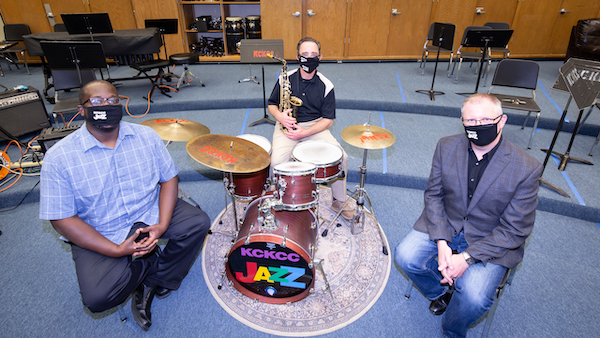Jan 13, 2026 2:09 PM
More Trump-Kennedy Center Cancellations
The fallout from the renaming of the John F. Kennedy Center for the Performing Arts to include President Donald…

Jazz educators John Stafford II (left), Jim Mair and Justin Binek of Kansas City Kansas Community College
(Photo: Larry F. Levenson)Being a music educator during the pandemic requires a deep commitment to public health. Teachers who conduct in-person instruction have dual responsibilities: They should help students develop their musical chops while also following protocols to help prevent the spread of COVID-19 on campus.
With fall classes in session, educators at Kansas City Kansas Community College are striving to protect the health of students, faculty, staff and local residents.
When DownBeat sent an email to John Stafford II—the coordinator of KCKCC’s music department—regarding steps the school is taking for safe on-campus instruction, his reply was extensive. Stafford’s email described the mandatory use of face coverings and maintaining social distance; the use of air purifiers in music classrooms; a facility’s new HVAC system with HEPA filters; a cleaning regimen for classrooms; assigning microphones to individual students, who are required to clean them after every use; conducting rehearsals outdoors whenever possible; the use of mutes and covers for brass instruments; and safety procedures for emptying instruments’ spit valves.
In mid-October, DownBeat conducted videoconference interviews with Stafford and his fellow music educators Justin Binek and Jim Mair—as well as KCKCC Interim Vice President of Academic Affairs Jerry Pope—to gain insights about safe in-person instruction.
These interviews revealed other steps the school has taken, including reducing the number of students on campus at any given time, holding classes in larger rooms, and creating signs to direct the flow of foot traffic.
“Our college came up with a really detailed COVID plan for the summer and for the fall,” Stafford said. “Another reason why things have gone well here is that 70 percent of our classes throughout the whole college are either virtual or online, whereas only 30 percent of the classes are [in-person] on campus.
“So, you notice the difference when you drive up to the parking lot, with [fewer] cars. When we walk the halls, there’s less people. I feel very safe coming here because you can distance yourself from people quite easily because of the rules in place.”
Binek echoed that sentiment: “I feel safer at school than I do at the grocery store.”
“I haven’t had one student complain about wearing the mask,” Mair added. “[Students understand that] these are the rules, this is what we gotta do, and we’re going to make it work. The buy-in is good.”
Getting a high-quality music education is crucially important for students, whether they plan to enter the workforce right away, or whether they intend to earn an associate in arts degree at KCKCC and then pursue a bachelor’s degree at another school. KCKCC alumni have gone on to enroll at such prestigious institutions as the University of Missouri–Kansas City, the University of Kansas and the University of North Texas.
Binek, Mair and Stafford all marveled at how well their music students have been playing this fall.
“Part of the reason why our ensembles are doing amazing work so far in this semester is that our students are really focused,” Binek explained. “They appreciate the fact that they actually have the opportunity to be together—because they know that there are schools where this isn’t the case. We’re [mainly] a commuter campus. As a community college, we don’t have fraternity houses. We don’t have big dorms that could potentially lead to certain issues that other schools have encountered.”
KCKCC has a main campus, plus seven other education centers or locations. On the school’s website, at press time, the COVID-19 Case Notifications chart indicated only six cases identified for the period of Nov. 3–11.
“One thing we’ve learned is that our protocols work,” Pope said. “We tasked our campus police with going around and monitoring [behavior], and they report what we call mask violations. And those have decreased [over time]. In fact, the [report] I got this week had no violations whatsoever.”
KCKCC’s Spring 2021 classes are scheduled to begin on Jan. 19.
In addition to learning about music theory and developing skills in areas such as musical performance and audio engineering, KCKCC students are learning important life lessons, according to Mair.
“I often tell [students], ‘Success in life is how you respond to Plan B, because Plan A doesn’t always pan out.’ So, this is about life lessons and responsibility: We’re all trying to keep each other safe.” DB
This story originally was published in the January 2021 issue of DownBeat. Subscribe here.

Belá Fleck during an interview with Fredrika Whitfield on CNN.
Jan 13, 2026 2:09 PM
The fallout from the renaming of the John F. Kennedy Center for the Performing Arts to include President Donald…

Peplowski first came to prominence in legacy swing bands, including the final iteration of the Benny Goodman Orchestra, before beginning a solo career in the late 1980s.
Feb 3, 2026 12:10 AM
Ken Peplowski, a clarinetist and tenor saxophonist who straddled the worlds of traditional and modern jazz, died Feb. 2…

The success of Oregon’s first album, 1971’s Music Of Another Present Era, allowed Towner to establish a solo career.
Jan 19, 2026 5:02 PM
Ralph Towner, a guitarist and composer who blended multiple genres, including jazz — and throughout them all remained…

Rico’s Anti-Microbial Instrument Swab
Jan 19, 2026 2:48 PM
With this year’s NAMM Show right around the corner, we can look forward to plenty of new and innovative instruments…

Richie Beirach was particularly renowned for his approach to chromatic harmony, which he used to improvise reharmonizations of originals and standards.
Jan 27, 2026 11:19 AM
Richie Beirach, a pianist and composer who channeled a knowledge of modern classical music into his jazz practice,…